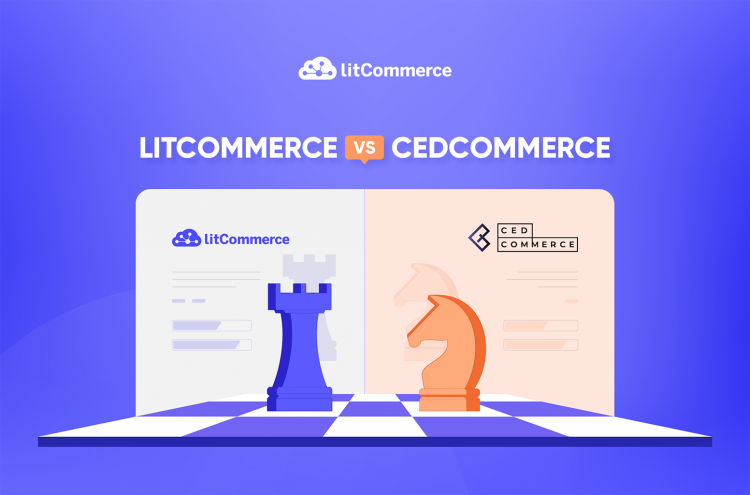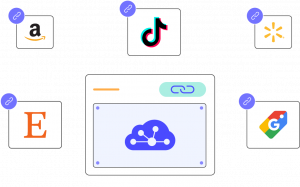Multichannel selling plays a vital role in growth strategies to upscale a business as fast as possible. It is a way to display your brand to customers at all stages of the buying journey. However, choosing the right tool to manage multiple sales channels can be a daunting task.
In this article, we will compare two popular multichannel selling solutions – LitCommerce and CedCommerce. We also give you some insights to find out which one is better for your business needs.
We will provide you with a detailed comparison by diving further into:
- #1. Pricing
- #2. Ease of use
- #3. Sync features
- #4. Listing management
- #5. Order management
- #6. Sales report
- #7. Scalability
- #9. Help and support
Let’s dive in!
Learning the Basic: LitCommerce and CedCommerce
Before diving deep into the two multichannel selling software: LitCommerce vs CedCommerce, it is essential to have a basic understanding of them.
What is LitCommerce?
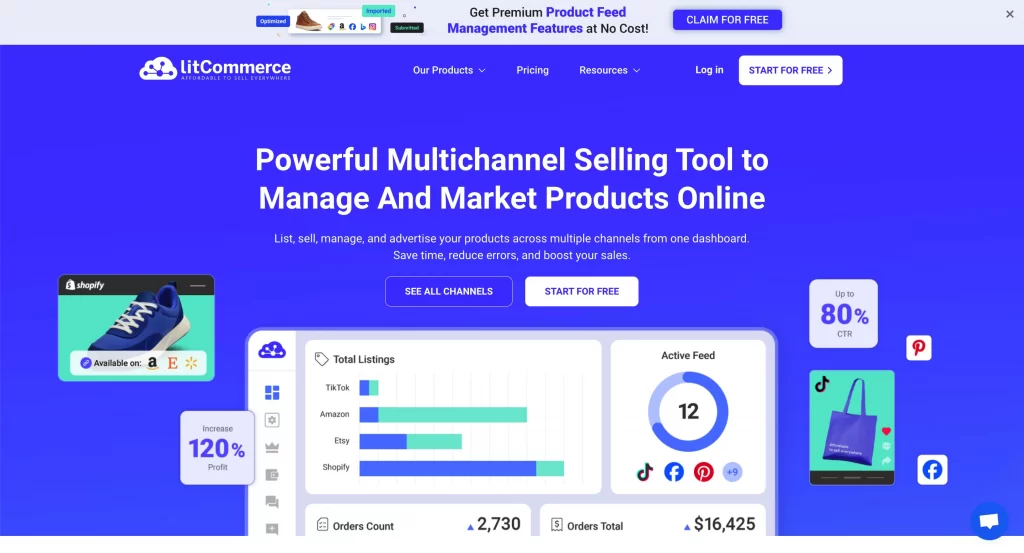
LitCommerce was launched in 2021 with a clear mission: to help online sellers list and sell products across multiple ecommerce platforms and marketplaces like Amazon, Etsy, eBay, Walmart, and more. It’s designed to simplify multichannel selling by allowing you to manage listings, inventory, and orders from one central dashboard—no technical skills needed.
The platform stands out for its balance between powerful features and a clean, beginner-friendly interface. Whether you’re a solo seller or running a growing business, LitCommerce makes it easy to expand your reach without the complexity.Beyond multichannel listing, LitCommerce also offers a built-in Product Feed management tool. This feature helps you sync your product data to major advertising platforms like Google Shopping, Facebook, TikTok, Pinterest, and Bing. With smart category mapping, bulk feed rules, automated syncing, and built-in quality checks, your product feeds stay accurate and optimized—boosting visibility through both paid and organic campaigns.
What is CedCommerce?
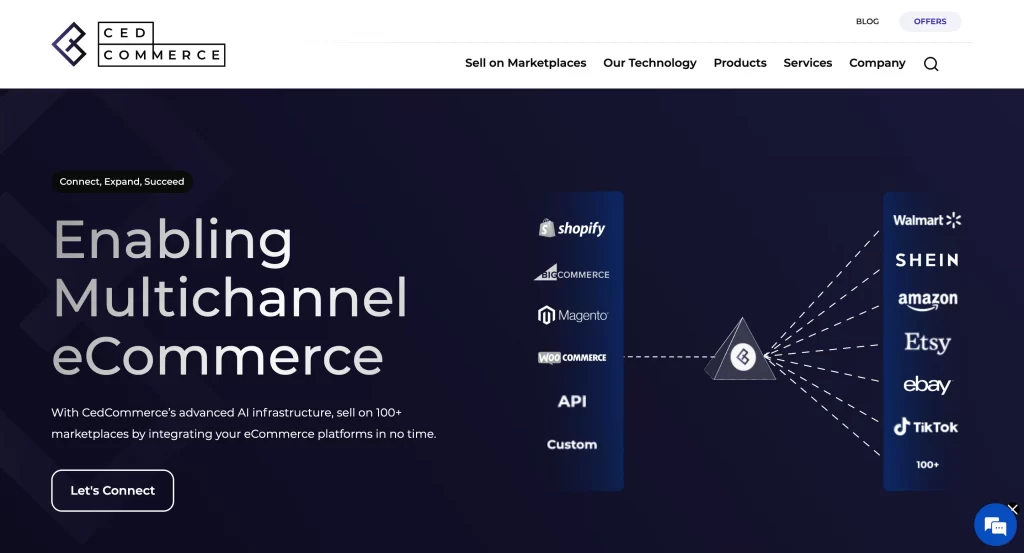
CedCommerce is an eCommerce solution provider that offers a variety of tools and services to help businesses manage their online operations. Its core products include multichannel integration tools that connect online stores with global marketplaces such as Amazon, Walmart, and eBay. These tools are designed to support inventory sync, centralized order management, and bulk product listing, helping sellers streamline their operations across platforms.
The platform emphasizes scalability, international selling, and compatibility with major ecommerce systems like Shopify, WooCommerce, BigCommerce, and Magento. CedCommerce aims to support both small businesses and larger enterprises by offering customizable solutions that adapt to different selling needs.
LitCommerce vs CedCommerce: Pros and Cons
Before jumping into the extensive comparison between LitCommerce vs CedCommerce, let’s have a closer look at their advantages and disadvantages.
Pros and cons of LitCommerce
Pros | Cons |
✧ Diverse eCommerce platforms and marketplaces connection ✧ Powerful integration tool ✧ Ease to use ✧ Suitable pricing plan including a free plan | ✧ No third-party integration for processing orders |
Strengths:
- Diverse eCommerce platforms and marketplaces support:
- 9 shopping carts:
- Shopify
- Wix
- WooCommerce
- BigCommerce
- Squarespace
- Square
- PrestaShop
- And CSV file as well.
- 12 marketplaces:
- TikTok Shop
- Etsy
- eBay
- Walmart
- Amazon
- Temu
- Faire
- Shein
- Reverb
- Google Merchant
- Facebook Shops
- Shopee
- 9 shopping carts:
- Powerful listing editor. One of LitCommerce’s strongest features is its intuitive multichannel listing editor, which lets you create and update listings quickly without technical knowledge. You can manage product details like titles, prices, and images in one place, then push them to multiple marketplaces at once. The system is built to reduce manual work and ensure accurate product syncing, giving you more time to focus on growing your business.
- Easy to use. LitCommerce is designed to be easy to use, even if you’re new to multichannel selling. From the main dashboard, you can follow a built-in starter guide to set up your store, connect channels, and start listing with confidence. Whenever you need help, quick video tutorials and in-app guidance are right there to walk you through each step.
- Suitable pricing plan. LitCommerce offers flexible pricing plans based on the number of marketplaces you connect and how many listings you manage. Whether you’re a small shop testing the waters or a growing business with thousands of SKUs, there’s a plan that fits your needs. You can start with a free trial to explore the core features, and paid plans begin at just $20 per month. This tiered approach makes it easy to scale as your business grows.
Weaknesses:
- No third-party integration for processing orders
Get Started With LitCommerce Today!
Join thousands of merchants who use LitCommerce to expand their business faster and better than ever before.
Pros and cons of CedCommerce
Pros | Cons |
✧ Support for 6 eCommerce platforms & 160+ marketplaces ✧ Integration for shipping, accounting, email marketing, EPOS, and marketing solutions, etc. | • Complex steps and different app management for integrations. • High cost |
Strengths:
- Provide support for 6 eCommerce platforms & 100+ marketplaces such as Etsy, Amazon, eBay, AliExpress, Walmart, etc.
- Allow integration for shipping, accounting, email marketing, EPOS, marketing solutions, etc.
Weaknesses:
- Require complex steps and different app management for integrations. For instance, to integrate Shopify Store with both Etsy and eBay, two plugins need to be installed – one for Shopify-Etsy integration and another for Shopify-eBay integration. This results in higher operational costs compared to other multi-channel solutions.
- Have a high cost. This is not the best solution for sellers with a limited budget for operations, starting from 99$ per year. CedCommerce also provides a free plan for store owners to experience its products before deciding to purchase.
LitCommerce vs CedCommerce: An Extensive Comparison
#1. Pricing
LitCommerce
Depending on the number of total listings, sales channels,… LitCommerce offers different pricing plans so that e-sellers can pay the most reasonable fee for their business size. It ranges from 29$ to 149$ per month if you subscribe to a monthly plan.
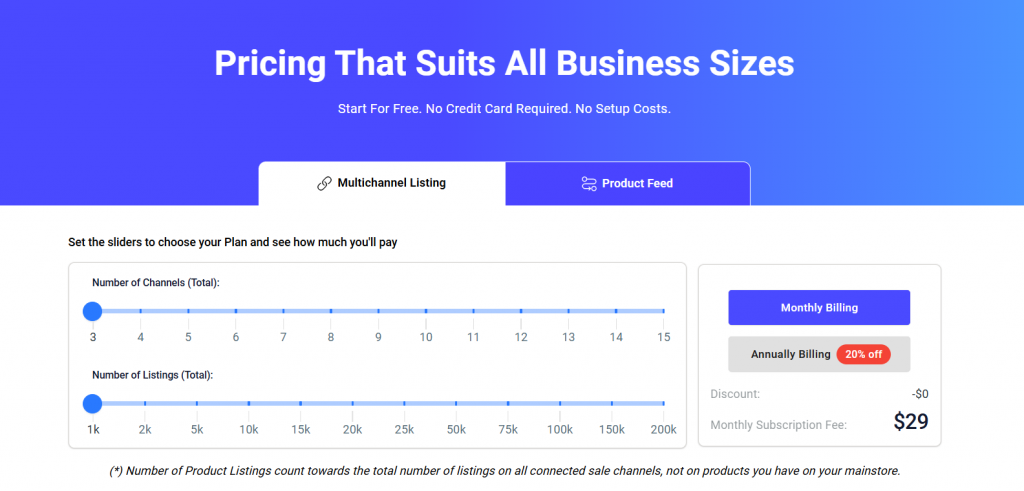
The tool offers various features to suit the needs of each business. The important thing is, you only pay what you want to get.
LitCommerce provides a 7-day FREE trial for businesses with full features access. This is often suitable for those who want to experience whether their chosen selling channels match this app or not.
Depending on each type of plan, LitCommerce App provides relevant entities/support as below:
- Number of product listings: As you choose a higher tier, LitCommerce allows you to import and list a max of 200,000 listings per channel.
- Number of orders per month: From higher plans, sellers can have unlimited orders pulled from all channels that they’re selling.
- Integrated channels number: Depending on your needs, the higher plan you choose, the more channels you can integrate with.
- Inventory and price sync frequency: For all paid plans, your inventory and pricing will be updated every 15 minutes, hence, you don’t need to worry about missing products during the sales activities.
- Top-rated customer service via email and chat support: All users from any paid plan can have nearly 24/7 customer support anytime, whenever a problem arises.
Moreover, online merchants have the right to cancel/change plans at any time to fit your current business status.
TIPS: Save 20% by subscribing to the annual plan when choosing LitCommerce as your multichannel listing solution.
CedCommerce
CedCommerce offers a range of integration plugins for various eCommerce platforms, including Magento, WooCommerce, Shopify, and more. The pricing for these plugins can vary depending on the specific platforms and plugins you are interested in. Here’s a detailed overview of CedCommerce integration pricing plans:
1. Free Plan: offers some integration plugins for free, including Etsy Marketplace Integration, Walmart Marketplace Integration, and more. These plugins typically offer basic features and limited functionality.
2. Paid Plans: One important thing to note about CedCommerce’s pricing is that it varies depending on the platform you want to integrate with. Each marketplace—such as Amazon, Walmart, or Etsy—has its own dedicated pricing structure, which means sellers must evaluate plans individually based on where they sell.
For example, CedCommerce’s Etsy integration offers multiple pricing tiers tailored to different business sizes and syncing needs:
- Beginner – $9/month or $108/year: Best suited for hobby sellers. You can list up to 10 products, with basic support and Shopify to Etsy inventory sync. Order syncing and advanced features are not included.
- Beginner Plus – $29/month or $313/year (10% off): Designed for growing sellers. It supports up to 200 product listings and 100 Etsy orders/month. You also get price syncing, multi-location support, and bulk editing.
- Growth – $59/month or $601/year (15% off): For scaling businesses, this plan includes 1,000 product listings and 500 orders/month. Additional features include Etsy-to-Shopify sync, review exports, and more.
- Growth Plus – $99/month or $950/year (20% off): Aimed at advanced sellers. You can list up to 10,000 products, sync 1,000 orders/month, and access real-time syncing, multi-lingual support, and metafield mapping.
- Enterprise – Custom Pricing: For high-growth brands managing 1,000+ orders/month. This plan offers custom listing limits, tailored onboarding, and priority support.
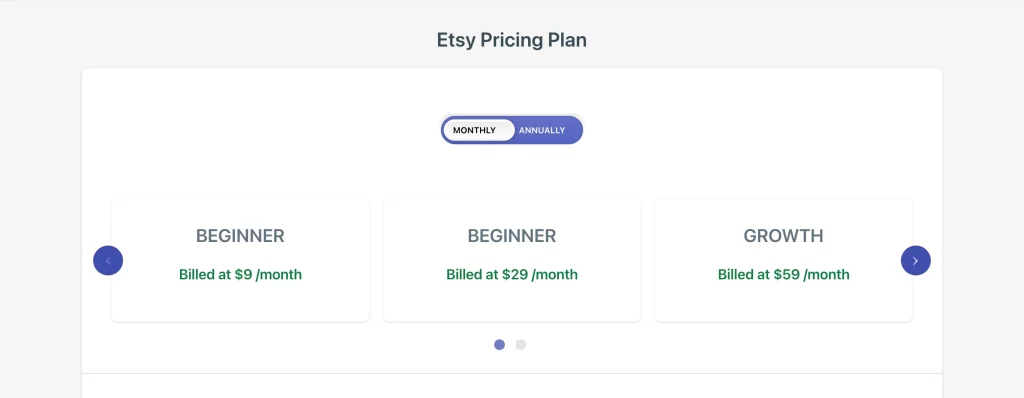
Verdict: CedCommerce may offer broader enterprise-level customization, but LitCommerce provides better value and flexibility for small to mid-sized sellers, especially those just starting with multichannel selling.
#2. Ease of use
Ease of use is undoubtedly an integral key factor that you shouldn’t overlook since you regularly work on the system. Therefore, an easy-to-use integration platform for controlling your sales channels will surely take into consideration. Let’s find out LitCommerce vs CedCommerce, which one is easier to navigate?
LitCommerce
The simple user interface of the LitCommerce app ensures online store administrators manage their online market effortlessly. Its intuitive front design helps beginners easily use the app professionally. Once you have successfully connected the sales channels, you will be directed to the main dashboard. From here, all the information you need to control will appear on the same page.
Before diving into this multichannel tool, the system will guide you through some basic steps in videos or usage guides. These steps help have a better understanding of how to use the LitCommerce app.
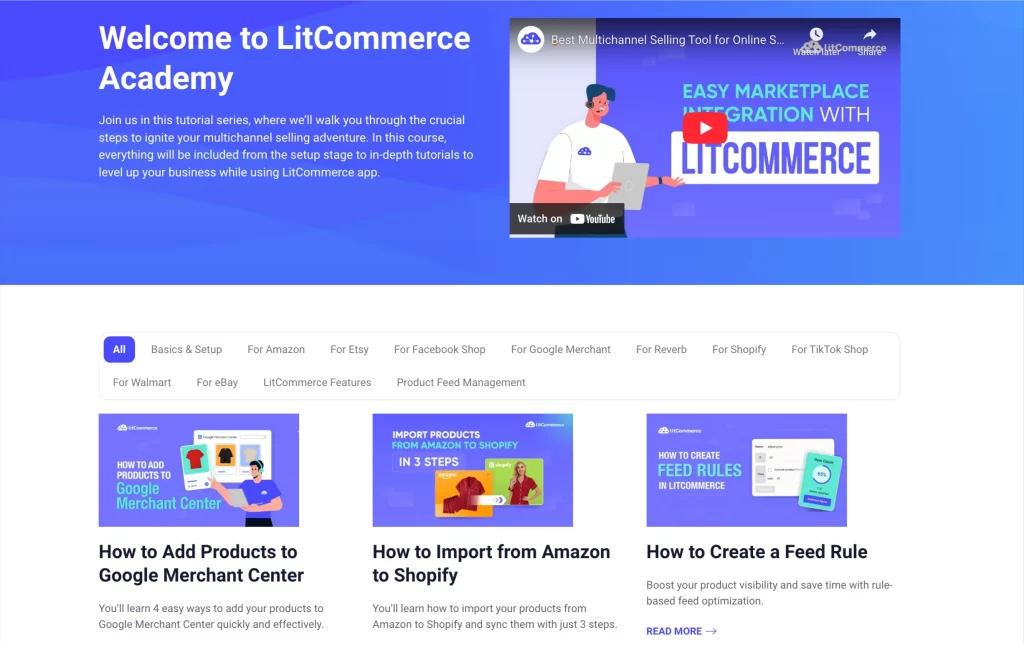
After connecting your Main store and sales channels, you will be directed to the main dashboard of LitCommerce. Here, you will have access to a comprehensive overview of your business performance, which includes information such as your total orders, total listings, and other relevant metrics.
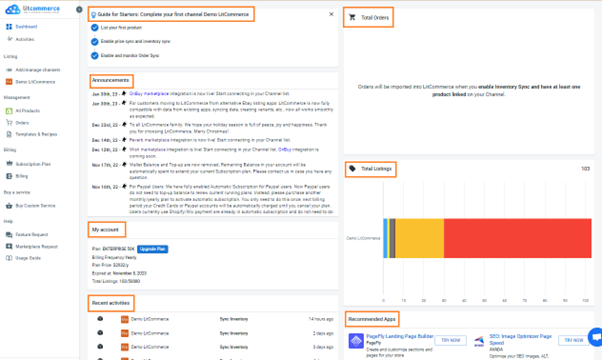
Here is what we define LitComerce as one of the most easy-to-use multichannel selling solutions for any sellers:
- Inventory management: allows sellers to manage their inventory across all sales channels from a centralized dashboard. You can set stock limits from minimum to maximum for each product you want to set on a specific channel.
Moreover, setting up low stock alerts and automatically updating inventory levels across all channels when a product sells is also included. As mentioned above, LitCommerce updates your inventory every 15 minutes, so you don’t need to worry about overselling or missing any products during the journey with LitCommerce.
- Order fulfillment: what LitCommerce doesn’t have is the order fulfillment feature. However, you can manage and track orders from all your sales channels from your own online store (known as Main Store). The best part is that whenever a new order arrives from any sales channel will be pulled into your store’s dashboard. As a result, you can fulfill and ship the products right from your Main Store.
- Product listing optimization: create and manage product listings from one central location, and edit your product information for each sales channel. You can also bulk edit product information using the QuickGrid feature (only available for paid plans). Furthermore, LitCommerce allows users to use Template and Recipe to faster your product editing.
Even when you are still struggling with app usage, LitCommerce has a 24/7 support team assisting you anytime.
CedCommerce
CedCommerce is generally easy to use, especially for connecting platforms like Shopify, Etsy, and Amazon. Most users find the setup quick and the dashboard intuitive, with automated syncing and helpful listing templates that simplify multichannel management.
The platform offers a centralized dashboard for handling products, orders, and inventory across channels, reducing manual work. Attribute mapping and custom templates are useful for bulk editing and listing updates.However, ease of use can vary. While basic integrations are beginner-friendly, more advanced setups—especially on Magento—may require technical knowledge. Some users also report that documentation for complex features could be clearer.
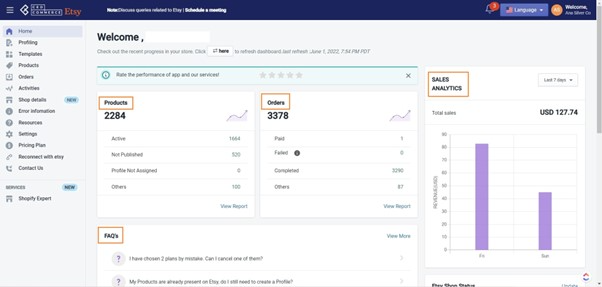
Overall, LitCommerce offers a clean, intuitive interface that’s easy for beginners to navigate, with guided setup and marketplace-friendly terminology. CedCommerce is user-friendly for basic setups but can feel complex for advanced configurations or technical users.
Verdict: Overall, LitCommerce is easier to use, while CedCommerce provides more flexibility at the cost of a steeper learning curve.
#3. Sync Features
Both LitCommerce and CedCommerce offer automatic syncing for product listings, inventory, and orders across your connected sales channels. This helps sellers maintain consistency across platforms, reduce manual errors, and avoid overselling. However, as with any third-party integration, real-time syncing depends not only on the tool but also on how quickly each marketplace processes updates.
LitCommerce
LitCommerce provides inventory and price sync every 15 minutes on most paid plans. While not instant, this update cycle is frequent enough for most small to mid-sized sellers.
LitCommerce also offers stock rules, allowing you to set minimum and maximum stock thresholds per channel to prevent stockouts or overselling. This is especially helpful when selling the same product across multiple platforms.
CedCommerce
CedCommerce also supports automated inventory and order syncing, but the frequency and limits vary by plan and integration. For example, in some entry-level plans (such as the Etsy Beginner Plus plan), order syncing is capped at 100 orders/month.
Higher-tier plans like Growth and Growth Plus offer more frequent syncing (e.g., real-time or hourly), but the full sync frequency details are not always clearly listed for every marketplace. Some users may experience delays depending on their plan and marketplace APIs.
Verdict: For predictable, straightforward syncing, LitCommerce is more transparent, while CedCommerce offers more flexibility at higher tiers.
#4. Listing management
Whether you are a small business owner or a large enterprise, scalability is a crucial factor in its growth and success. Luckily, both tools offer solutions that can help businesses of all sizes develop and expand. Depending on the size of your business, each multi-channel listing solution can support appropriate growth strategies for its clients.
LitCommerce
LitCommerce offers a clean and beginner-friendly listing editor that lets you edit product titles, descriptions, prices, images, and more—all from a centralized dashboard.
You can make bulk edits using the powerful built-in editor and customize listings per channel without affecting your main store data. The interface also provides preview options, so you can see how your listings will look on each marketplace before pushing them live.
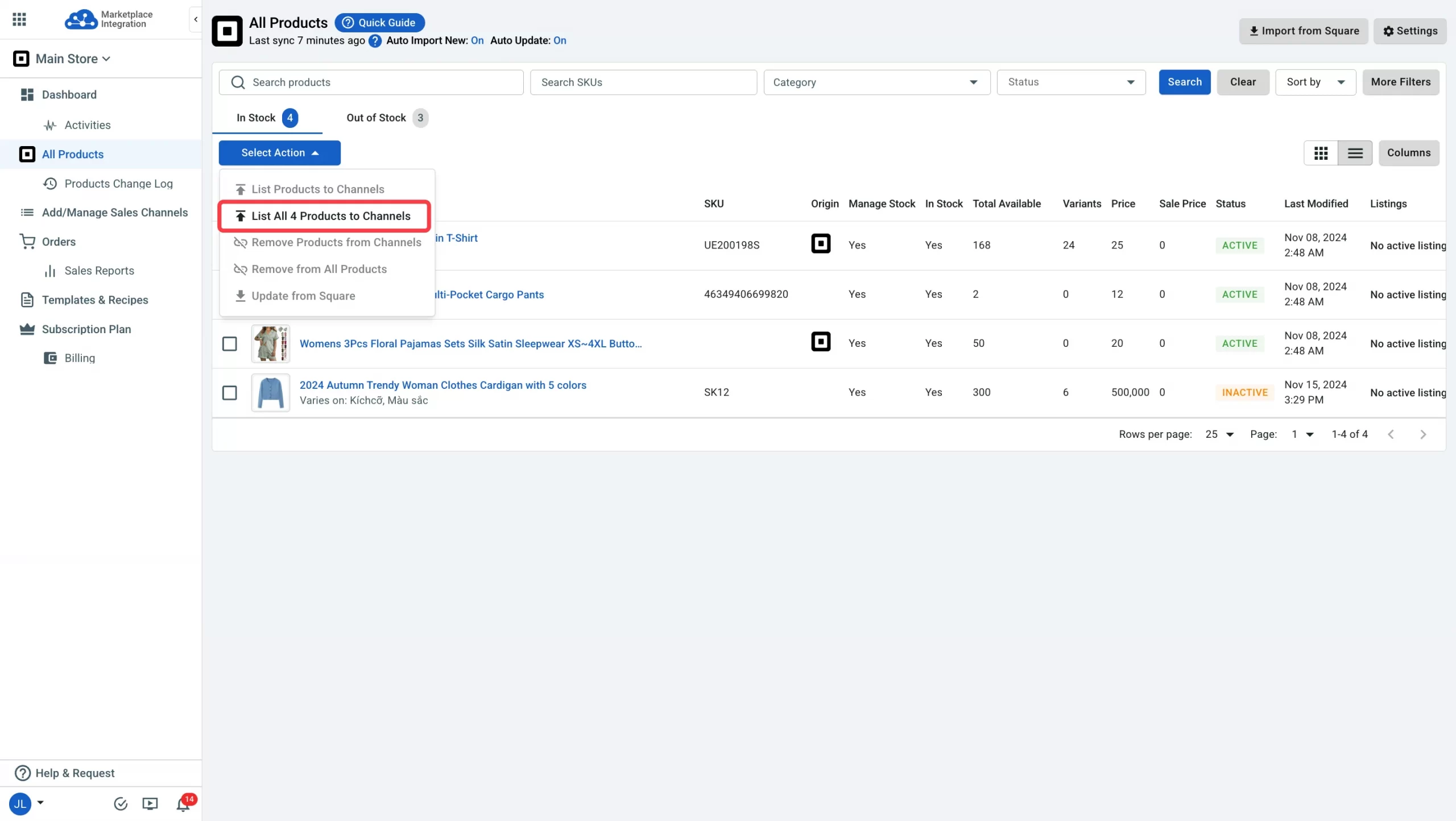
Additionally, LitCommerce supports smart category mapping, allowing you to match your product categories to each marketplace’s taxonomy for better visibility. It’s especially useful for sellers who want to maintain consistency but still tailor listings to each platform’s standards.
CedCommerce
For instance, advanced features like multi-lingual listings, metafield mapping, and real-time content sync are only available in higher-tier plans or for certain marketplaces like Etsy or Amazon.
While CedCommerce offers powerful listing customization and support for large catalogs, some features feel fragmented across modules or require separate setup steps, especially for first-time users.
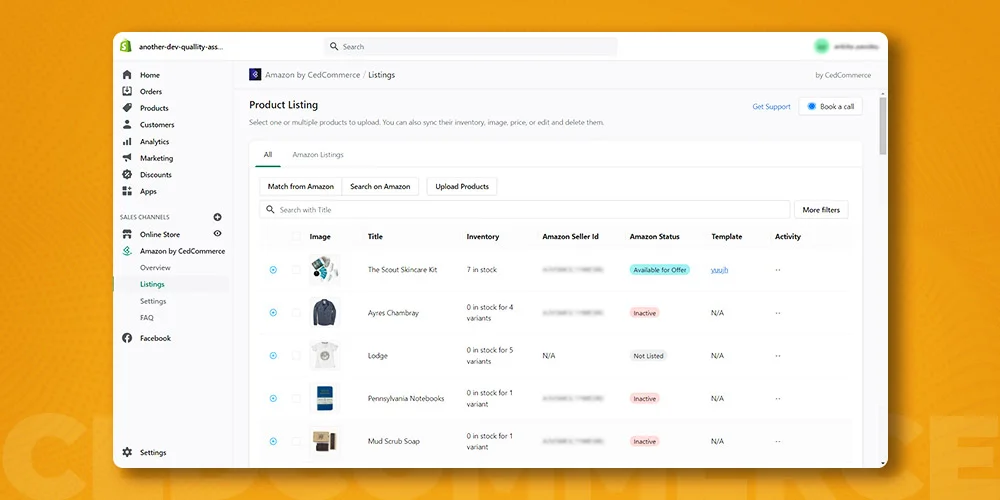
Verdict: For simplicity and ease, LitCommerce has the edge, while CedCommerce suits sellers needing deeper, large-scale customization.
#5. Order management
Efficient order management is key to running a successful multichannel operation. Both LitCommerce and CedCommerce offer order syncing across connected marketplaces and ecommerce platforms, but they differ in how deeply they handle fulfillment workflows and shipping.
LitCommerce
LitCommerce allows you to sync orders from marketplaces like Etsy, eBay, Amazon, and more directly into your ecommerce platform (such as Shopify or WooCommerce).
From there, you can manage, fulfill, and update order statuses all in one place. Inventory levels are automatically adjusted based on fulfilled orders, helping you avoid overselling.
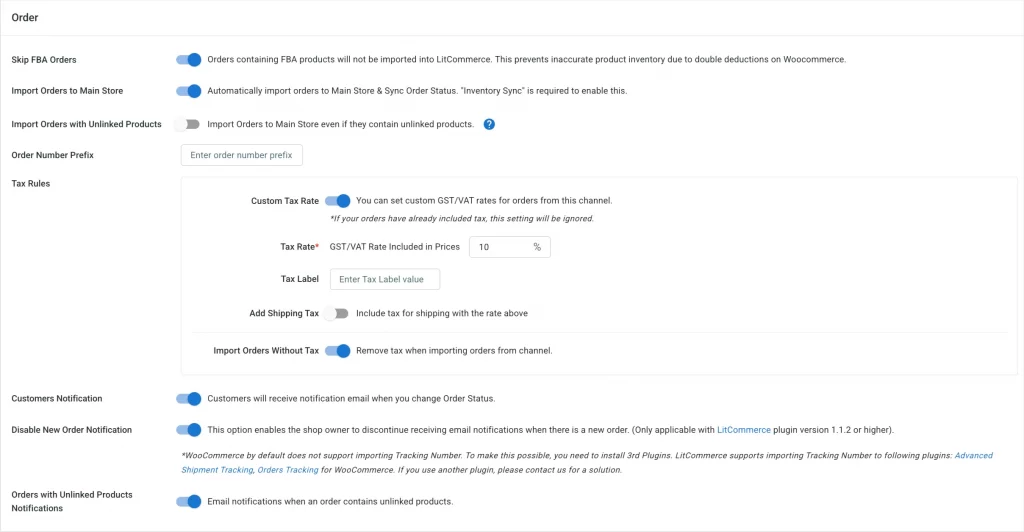
However, LitCommerce does not integrate directly with shipping carriers. This means you’ll need to use your ecommerce platform or a third-party shipping app to handle shipping labels, tracking numbers, and carrier selection. For most sellers, this setup works smoothly—especially if you already fulfill orders through your main store—but it’s something to consider if you’re looking for an all-in-one solution with built-in shipping tools.
CedCommerce
CedCommerce also offers centralized order syncing, but the depth of functionality depends on your integration and pricing tier. Lower plans include basic sync limits (e.g., 100–500 orders/month), while real-time syncing, order auto-acknowledgement, and advanced fulfillment workflows are often available only in higher-tier or enterprise packages.
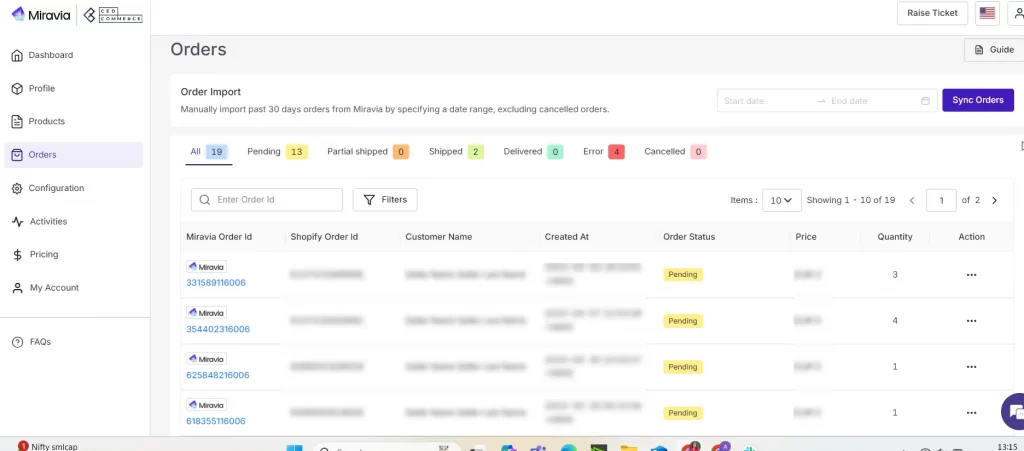
One advantage of CedCommerce is that it can integrate with some shipping solutions, depending on the platform. Features like bulk fulfillment, shipping updates, and custom rules per marketplace are supported—especially in advanced plans or when connecting to marketplaces like Amazon or Walmart.
Verdict: For basic order management, LitCommerce is simpler, while CedCommerce is better suited for complex workflows and built-in shipping needs.
#6. Sales report
Both LitCommerce and CedCommerce provide valuable sales reporting features for multichannel sellers, but they differ in terms of depth, customization, and usability. While LitCommerce has recently improved its reporting for easier visualization, CedCommerce offers more advanced analytics geared toward larger operations.
LitCommerce
As of mid-2025, LitCommerce has improved its sales reporting tools, offering clearer charts and more intuitive dashboards. Sellers can now view channel-specific performance, product-level insights, and order summaries across selected timeframes. Reports can be filtered by marketplace, product type, or sales period, making them useful for multi-store analysis.
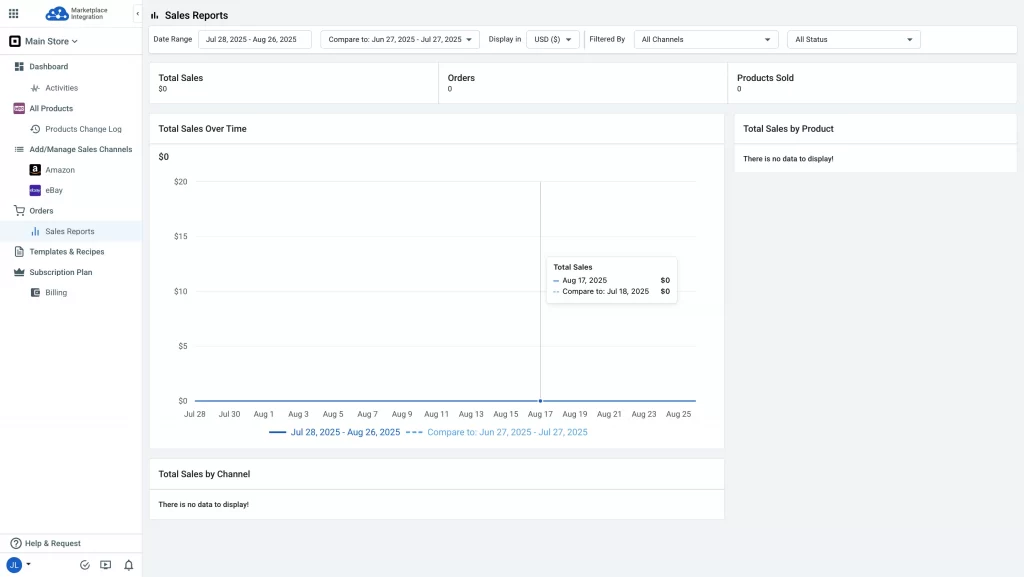
The reports are accessible via a centralized, easy-to-use dashboard, designed to offer actionable insights without overwhelming the user. CSV export and external feed integration are also supported, making it easy to pair LitCommerce with external tools for deeper reporting if needed.
CedCommerce
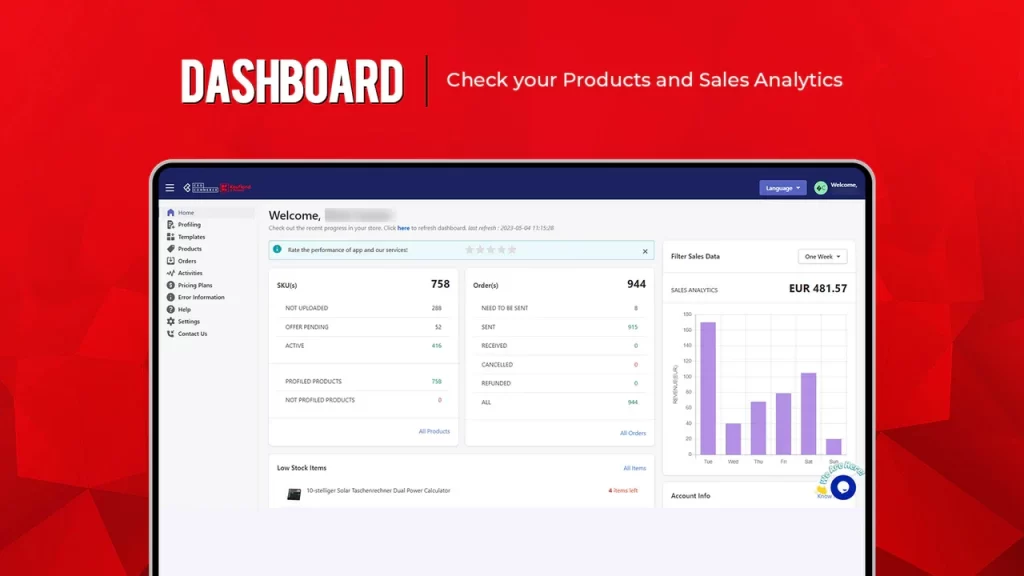
CedCommerce provides a real-time analytics dashboard with deeper data visibility across all connected sales channels. You can track revenue trends, order sync history, inventory performance, and top-performing products in a more detailed and customizable format.
Reports can be tailored with custom metrics, filters, and regional breakdowns, and they integrate well with automation tools and inventory workflows. CedCommerce also supports full data export, API access, and ERP/CRM integrations—making it a solid choice for sellers with complex analytics needs.
Verdict: For straightforward insights, LitCommerce is more user-friendly, while CedCommerce wins on analytics depth and flexibility.
#7. Scalability
Whether you are a small business owner or a large enterprise, scalability is a crucial factor in its growth and success. Luckily, both tools offer solutions that can help businesses of all sizes develop and expand. Depending on the size of your business, each multichannel listing solution can support appropriate growth strategies for its clients.
LitCommerce
LitCommerce makes it easy for businesses of any size to scale across multiple sales channels. With support for 20+ major platforms—including Etsy, Amazon, eBay, Walmart, and more—sellers can expand to new markets without juggling multiple systems.
With LitCommerce, businesses can easily expand their sales to new channels and markets without having to worry about the operational complexities of managing multiple channels separately. The platform’s centralized dashboard provides sellers with real-time data on inventory levels, orders, and customer information across all their channels, enabling them to make informed decisions and manage their business efficiently.
In addition, this multichannel selling tool offers features such as bulk product listing and order management, which allow sellers to easily scale their business and save time. By automating routine tasks and providing a seamless user experience, LitCommerce can help businesses to scale up their multichannel sales while reducing the risk of errors and operational inefficiencies.
CedCommerce
CedCommerce is designed to be a scalable solution for businesses that sell on multiple channels. The platform is built to handle a large volume of product listings, orders, and inventory data. It provides tools to help sellers automate routine tasks and manage their business efficiently.
This multichannel tool integrates with popular eCommerce platforms such as Shopify, Magento, and WooCommerce and also enables businesses to easily scale their operations. These integrations provide seamless connections between CedCommerce and these platforms, allowing sellers to manage their multichannel sales from within their existing eCommerce platform.
In addition, CedCommerce offers a range of features such as automated repricing and custom pricing rules that can help businesses to stay competitive in the marketplace and scale their sales.
Verdict: LitCommerce is ideal for small to mid-sized businesses looking to scale quickly across 20+ sales channels with minimal setup. In contrast, CedCommerce is better suited for high-volume sellers or businesses needing deep integrations with platforms like Magento or Shopify.
#9. Help and support
Both LitCommerce and CedCommerce provide responsive, multi-channel customer support with solid reputations among users.
LitCommerce
LitCommerce offers a wide range of support options, including 24/7 live chat (Monday–Saturday), email, ticketing, phone or video calls, and step-by-step onboarding materials. Live chat support is available during nearly all hours of the week—including holidays—and is known for its fast response time and helpful walkthroughs.
Support hours (GMT+7):
- Monday: 04:00 AM – Midnight
- Tuesday to Saturday: 24/7
- Sunday: 08:00 AM – Midnight
Customers regularly praise LitCommerce for being quick, professional, and proactive—especially during the setup phase or when resolving sync-related issues.

In addition, the LitCommerce Academy, video tutorials, and rich documentation make self-service support easily accessible.
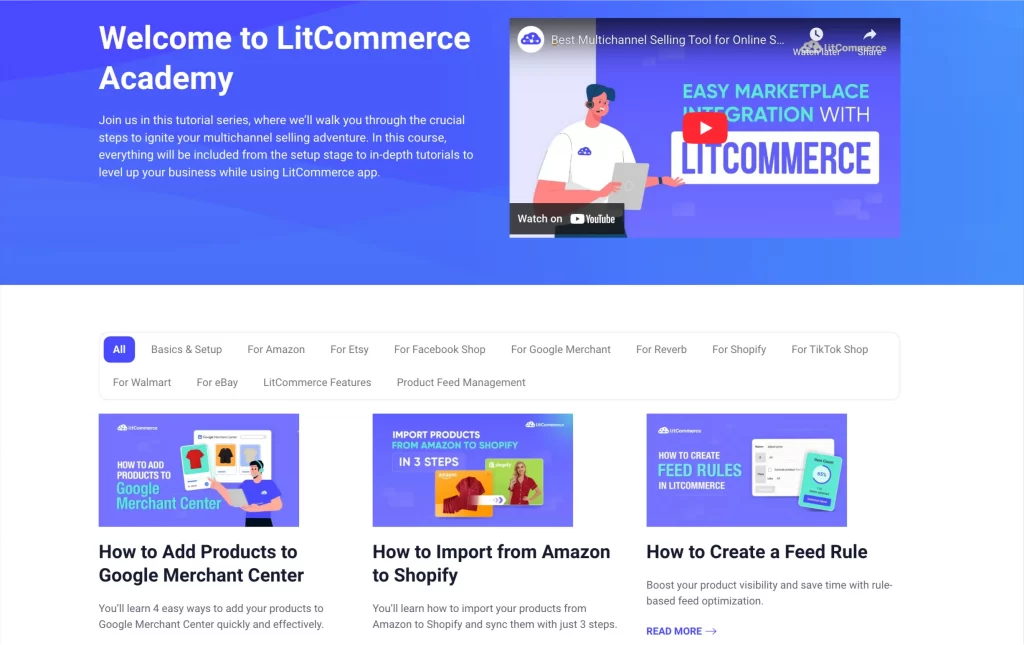
CedCommerce
CedCommerce also provides a full suite of support channels, including live chat, email, phone support, and ticket-based help. For paid extensions, 24/7 support is available for the first three months, with extended support available for an additional fee. Where CedCommerce truly shines is in technical support for complex integrations, such as multi-channel plugins or tailored marketplace solutions.
→ Verdict: LitCommerce stands out with broader live chat availability, fast response times, and helpful onboarding—ideal for sellers who need quick, accessible support. In contrast, CedCommerce excels in technical support for complex setups, but full 24/7 access often requires a paid extension or higher-tier plan.
LitCommerce vs CedCommerce: Final Comparison
Multichannel listing software has made it easier than ever for sellers to expand across platforms and streamline operations. While both LitCommerce and CedCommerce offer valuable features, LitCommerce stands out for its ease of use, broader marketplace support, transparent pricing, and responsive customer service.
If you’re looking for a flexible, beginner-friendly solution with powerful tools to grow your multichannel business, LitCommerce is a smart choice worth trying. Whether you’re just starting out or scaling up, it’s designed to help you sell more—with less hassle.
LitCommerce vs CedCommerce: FAQs
- Why is multichannel selling important?
- Reach a wider audience
- Increase sales
- Diversify revenue streams
- Improve customer experiences
- Enhance competitive advantage
- Are there any softwares for multichannel selling?
Besides LitCommerce and CedCommerce, we also introduce other platforms, including:
- ChannelAdvisor
- Sellbrite
- Skubana
- Codisto
- Ecwid
- Sellberry
- How do these integration platforms work?
Multichannel integration platforms work by connecting various sales channels and eCommerce platforms to a central hub or dashboard, which allows businesses to manage their inventory, orders, and listings across multiple channels from one place.
- How do I choose the right integration for my business?
Choosing the right multichannel integration platform for your business can be a significant decision, as it can impact your sales, operations, and overall success. Here are some factors to consider when choosing the right integration platform:
- Channels: Consider which sales channels you want to sell on, and make sure that the integration platform supports those channels. Also, check how many channels you can integrate with each plan.
- Features: Consider what features are important to your business, such as listing management, order management, inventory management, and reporting.
- Pricing: Based on the budget that your business is ready to pay for the software enabler, choose the best options that suit your company at that moment and in the long term.
- Ease of use: Last but not least, the way the administrators use the app also plays a critical vital when choosing a multi-channel eCommerce solution.
Final Thoughts
Multichannel listing software has made it easier than ever for sellers to expand across platforms and streamline operations. While both LitCommerce and CedCommerce offer valuable features, LitCommerce stands out for its ease of use, broader marketplace support, transparent pricing, and responsive customer service.
If you’re looking for a flexible, beginner-friendly solution with powerful tools to grow your multichannel business, LitCommerce is a smart choice worth trying. Whether you’re just starting out or scaling up, it’s designed to help you sell more—with less hassle.

